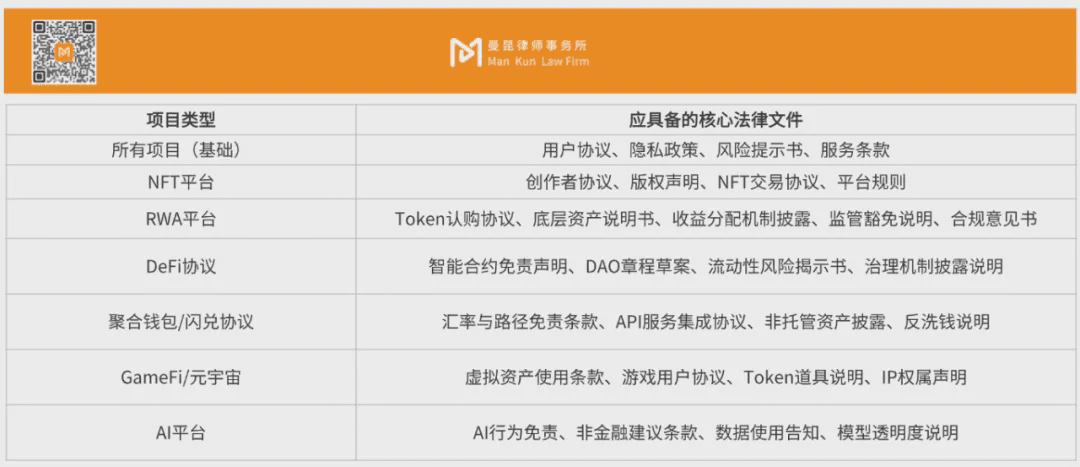Many Web3 project teams are busy with technology and financing before going live, but neglect the foundational construction of legal texts. Waiting until something goes wrong to find a lawyer to '补文' (supplement the text) not only addresses the symptoms but sometimes can't even be supplemented back.
In today's article, we will discuss: what legal documents a Web3 project really needs to prepare? What are these documents for? What happens if they are missing? Why must they be customized? What can lawyers really help you with? And what different services can we at Mankun bring in this regard.
What legal documents do you really need?
Different project types have slightly different core documents, but 99% of Web3 platforms cannot avoid the following categories:
Why are these documents important?
These documents are not for 'appearance' or for formality, but are a firewall you must establish before going live:
Prevent users from biting back: without an agreement, if a black swan event occurs, and users claim you did not disclose risks, it will be very difficult for you to prove otherwise;
Compliance interfaces require: fiat payment processors, cloud service providers, Token issuance platforms, all of which will check if you have these documents;
Basic review items for investors: without these documents, institutional investors will not dare to enter the market;
Regulatory spot checks must-check items: especially in jurisdictions like Hong Kong, Singapore, Dubai, EU, etc., the first step of regulatory review is these texts;
Prevent order jumping and plagiarism: agreements can also be designed with IP protection, prohibiting secondary use, authorization restrictions, and other anti-plagiarism mechanisms.
What will happen if these documents are missing?
Being identified by regulators as undisclosed, inducement, or illegal financial activities;
If user disputes occur, it is difficult for the platform to disclaim liability or claim limited compensation;
Being rejected for integration or forced to be removed by upstream partners (such as payment interfaces, cloud services);
Being recognized as involving securities issuance risks during Token secondary market or profit-sharing strategies;
In severe cases, it may even be listed as a high-risk service website and blocked from the blacklist.
Why can't these documents be 'copied from templates' or 'generated by AI'?
Many projects take shortcuts and simply copy a set of agreements from other projects or have AI generate a template to go live, with the result being:
Template logic does not match your own business, and the content is full of loopholes;
Risk warnings are insufficient, users can counter at any time;
Legal citations are not applicable (e.g., GDPR applies to Europe, but you have all Asian users);
What’s even scarier is that the document you are using may have already been sued, and you are completely unaware;
The core of legal documents is not 'having or not having', but 'correct or not correct' + 'can it withstand scrutiny in court'.
What can lawyers really do for you?
As frontline practical lawyers in Web3, what we provide is not 'documents', but 'solutions':
Sort out your business structure and risk points (compliance, user behavior, regulatory boundaries);
Draft all internal and external documents, including but not limited to user agreements, Token agreements, white paper disclosures, risk control statements, etc.;
Embed anti-money laundering (AML), KYC, non-securities disclaimers, etc., to enhance regulatory resilience;
Assist in designing 'signature mechanisms' to ensure legal effectiveness (e.g., clicking to agree, on-chain records);
Provide legal opinions and compliance statements to meet the needs of third-party integration/regulatory/banking.
What’s different about Mankun Law Firm?
We are not lawyers who create 'one-size-fits-all templates'; what we provide are truly 'customized for the project, able to be on-chain, interactive, explainable, and litigable' texts.
Familiar with various Web3 business models, no need for you to explain repeatedly;
Deeply track Web3 compliance policies in places like Hong Kong, Singapore, Cayman Islands, Dubai, EU, and the US;
Years of real project experience in Token issuance, trading platforms, AI + Web3, RWA, etc.;
Can provide supporting suggestions for your text landing scenarios, such as UI design tips, page structure compliance, risk control in registration paths, etc.
We know you are not 'doing it for lawyers to see', but to 'go live, raise funds, go public, negotiate cooperation, sign investors'. Every word we write is 'practical + risk-averse'.
Conclusion: Before going live, make sure to cover the legal document aspect.
Technology runs fast, but regulations chase even faster; no matter how new the business is, the legal bottom line must be maintained.
Don't wait until something happens to supplement the documents. By then, you not only need to supplement the legal texts but also deal with user compensation claims, account freezes, regulatory fines, and even criminal risks.
Every word and every page before going live is a contract between you and the world. And this set of 'contracts' is the first firewall of your Web3 product.
If you are preparing to launch a project, issue tokens, go overseas, or raise funds, feel free to chat. Clearly writing the rules is the beginning of your long journey.
Original Author: Lawyer Shao Jiadian
